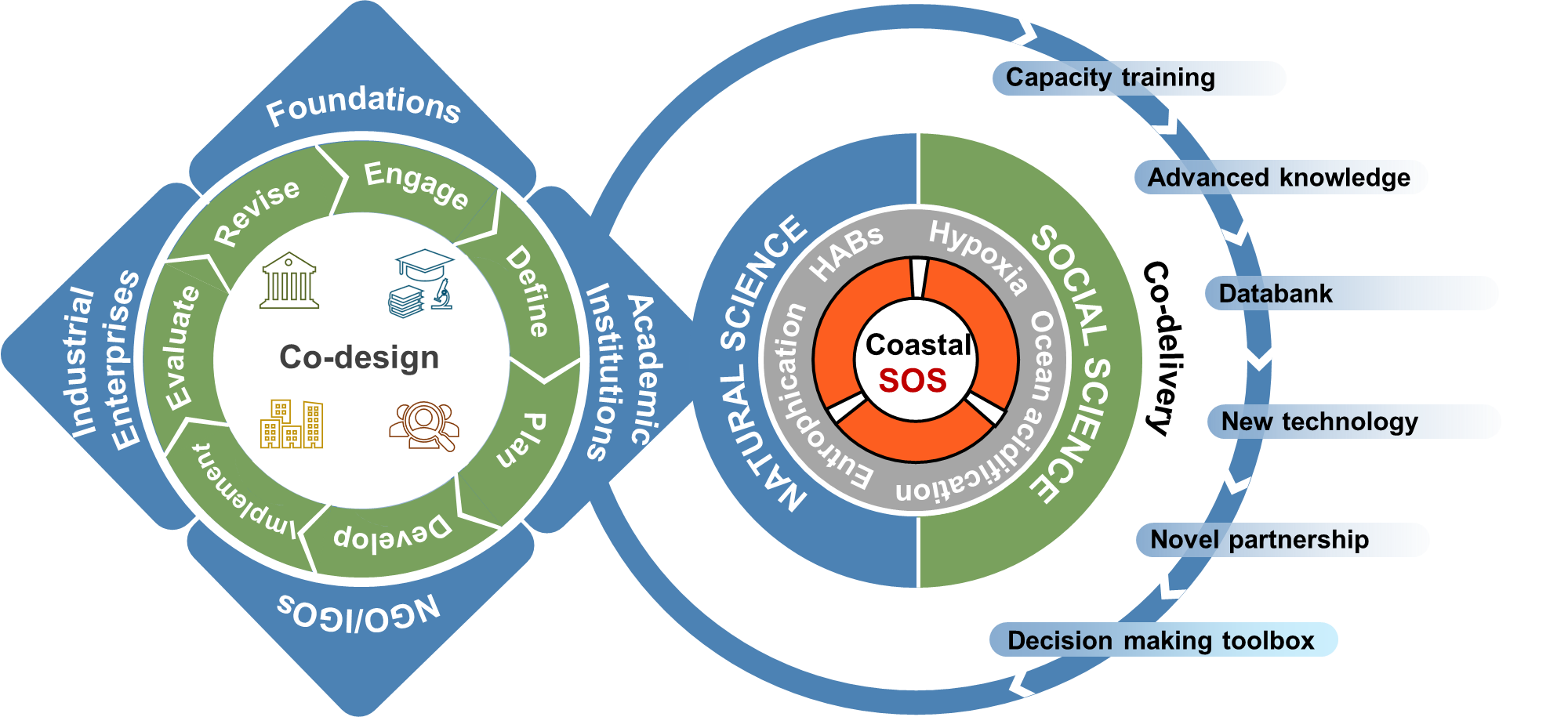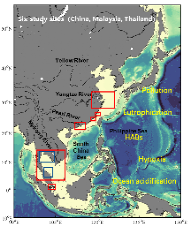COASTAL-SOS, or “Coastal Zones Under Intensifying Human Activities and Changing Climate: A Regional Programme Integrating Science, Management and Society to Support Ocean Sustainability,” is a recently endorsed project under the United Nations Decade of Ocean Science for Sustainable Development (2021-2030) (UN-Decade) (https://www.oceandecade.org/). Led by the State Key Laboratory of Marine Environmental Science (MEL) at Xiamen University, Coastal-SOS partners and cross-sectoral stakeholders, including leading academic institutions, industrial enterprises, non-profit foundations, and nongovernmental/intergovernmental organizations (NGO/IGOs) from east Asian countries, work together to advance scientific understanding of critical coastal ocean health issues.
On December 5th 2017, the 72nd session of the United Nations General Assembly (UNGA) decided to proclaim the “United Nations Decade of Ocean Science for Sustainable Development for the 10-year period beginning on 1 January 2021, within existing structures and available resources.” The UNGA requested the Intergovernmental Oceanographic Commission (IOC) provide information on the development of the implementation plan. The 75th session of the United Nations General Assembly deliberated and approved the implementation plan for the UN Decade of Ocean Science for Sustainable Development (2021-2030) (Ocean Decade) in 2020. The Ocean Decade was officially launched in January 2021 and aims at transformative ocean science solutions for sustainable development, connecting people and our ocean. Its vision is “The science we need for the ocean we want.” It’s an important UN resolution to promote sustainable ocean development and the most important global marine science initiative in the coming decade. It will have a far-reaching impact on the development of marine science and global marine governance.
As the gateway between the land and ocean, the coastal zone is home to over 50% of the world's human population and produces almost 50% of its gross domestic product (GDP). However, this vital region has undergone intensified pressures from human development and climate change ever since the Industrial Revolution, which have adversely impacted human society and impaired the region’s and, by extension, the global ocean’s sustainability.
Coastal-SOS focuses on East Asian seas, which nourishes one-fifth of the world’s population. It utilizes the Changjiang Estuary, Pearl River Estuary, Taiwan Strait (including Fujian sea areas such as Xiamen Bay, Xinghua Bay, Sansha Bay and Dongshan Bay), Gulf of Thailand, and Johore Strait as research and demonstration areas. Through comparative and interdisciplinary research, the programme will examine key physical, biogeochemical, and socioeconomic processes that govern the dynamics and consequences of coastal ocean eutrophication, pollution and climate change, and identify the major factors that have caused the environmental degradation of typical coastal zones over the past 50 years.
The programme aims to develop an integrated modelling and forecasting framework, using high-resolution coupled physical-ecosystem models and regional Earth system models that incorporate human dimensions. This framework will be used to predict coastal ecosystem changes in the next thirty years by conducting scenario analysis under different socio-economic pathways and the threat of climate change. The ultimate goal is to build a Digital Twin of the Ocean, which will serve as a science database and modelling platform for basic research and government decision-making. In addition, the programme will formulate a novel approach of cross-sectoral partnership in designing, conducting and delivering “the science we need for the ocean we want.” This will allow translation of improved scientific knowledge into practical solutions (including improved and integrated management strategies), and empower industry stakeholders to implement best practices in ocean usage.
(picture)
Partners of Coastal-SOS include: the State Key Laboratory of Marine Environmental Science (MEL), Xiamen University (the leader partner); the Second Institute of Oceanography (SIO), Ministry of Nature Resources, China; the Department of Earth System Science, Tsinghua University; The Hong Kong University of Science and Technology; The Swire Institute of Marine Science, The University of Hong Kong; the State Key Laboratory of Marine Pollution, City University of Hong Kong; the Marine and Coastal Resources Research & Development Institute (MCRDI), Department of Marine and Coastal Resources, Thailand; the Institute of Ocean and Earth Sciences (IOES), Universiti Malaya; the Institute of Oceanography and Environment (INOS), Universiti Malaysia Terengganu; the China-ASEAN College of Marine Sciences (CAMS), Xiamen University Malaysia; the China Oceanic Development Foundation, China; The Paradise International Foundation (PFI), China; Swire Group Charitable Trust (Swire Trust), Hong Kong, China; the CP Group Agro-industry and Food Business China Area (aquatic), China; ZPMC Maritime Fuzhou Construction Co., Ltd., China; Zhongtian Technology Marine Systems Co., Ltd., China; Luen Thai Group Limited (Luen Thai), Hong Kong, China; The China Navigation Pte. Ltd., Singapore; JEFI Aquatech Resources Sdn Bhd, Malaysia; Surface Ocean Lower Atmosphere Study (SOLAS); World Wide Fund for Nature (WWF) – Beijing Office, China; the Partnership in Environmental Management for the Seas of East Asia (PEMSEA); and the IOC Sub-Commission for the Western Pacific (WESTPAC).


https://ice.xmu.edu.cn/en/info/1128/1561.htm#:~:text=COASTAL-SOS%2C%20or%20%E2%80%9CCoastal%20Zones%20Under%20Intensifying%20Human%20Activities,Ocean%20Science%20for%20Sustainable%20Development%20%282021-2030%29%20%28UN-Decade%29%20%28https%3A%2F%2Fwww.oceandecade.org%2F%29.